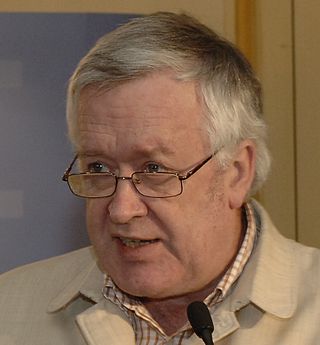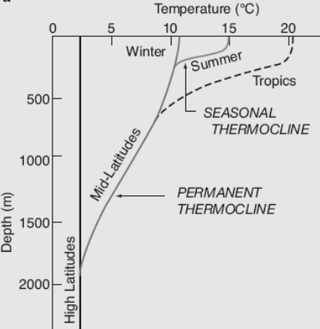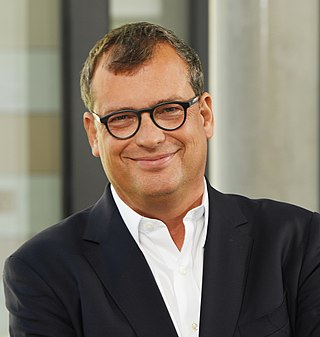
Numerical climate models are mathematical models that can simulate the interactions of important drivers of climate. These drivers are the atmosphere, oceans, land surface and ice. Scientists use climate models to study the dynamics of the climate system and to make projections of future climate and of climate change. Climate models can also be qualitative models and contain narratives, largely descriptive, of possible futures.

Global cooling was a conjecture, especially during the 1970s, of imminent cooling of the Earth culminating in a period of extensive glaciation, due to the cooling effects of aerosols or orbital forcing. Some press reports in the 1970s speculated about continued cooling; these did not accurately reflect the scientific literature of the time, which was generally more concerned with warming from an enhanced greenhouse effect.

Sea surface temperature is the temperature of ocean water close to the surface. The exact meaning of surface varies in the literature and in practice. It is usually between 1 millimetre (0.04 in) and 20 metres (70 ft) below the sea surface. Sea surface temperatures greatly modify air masses in the Earth's atmosphere within a short distance of the shore. The thermohaline circulation has a major impact on average sea surface temperature throughout most of the world's oceans.

Hans von Storch is a German climate scientist. He is a professor at the Meteorological Institute of the University of Hamburg, and Director of the Institute for Coastal Research at the Helmholtz Research Centre in Geesthacht, Germany. He is a member of the advisory boards of the journal Journal of Climate. He worked at the Max Planck Institute for Meteorology from 1986 to 1995 and headed the Statistical Analysis and Modelling research group there.
Klaus Ferdinand Hasselmann is a German oceanographer and climate modeller. He is Professor Emeritus at the University of Hamburg and former Director of the Max Planck Institute for Meteorology. He was awarded the 2021 Nobel Prize in Physics jointly with Syukuro Manabe and Giorgio Parisi.

Charles David Keeling was an American scientist whose recording of carbon dioxide at the Mauna Loa Observatory confirmed Svante Arrhenius's proposition (1896) of the possibility of anthropogenic contribution to the greenhouse effect and global warming, by documenting the steadily rising carbon dioxide levels. The Keeling Curve measures the progressive buildup of carbon dioxide, a greenhouse gas, in the atmosphere.

The Atlantic meridional overturning circulation (AMOC) is the main ocean current system in the Atlantic Ocean. It is a component of Earth's ocean circulation system and plays an important role in the climate system. The AMOC includes Atlantic currents at the surface and at great depths that are driven by changes in weather, temperature and salinity. Those currents comprise half of the global thermohaline circulation that includes the flow of major ocean currents, the other half being the Southern Ocean overturning circulation.

The ocean temperature plays a crucial role in the global climate system, ocean currents and for marine habitats. It varies depending on depth, geographical location and season. Not only does the temperature differ in seawater, so does the salinity. Warm surface water is generally saltier than the cooler deep or polar waters. In polar regions, the upper layers of ocean water are cold and fresh. Deep ocean water is cold, salty water found deep below the surface of Earth's oceans. This water has a uniform temperature of around 0-3 °C. The ocean temperature also depends on the amount of solar radiation falling on its surface. In the tropics, with the Sun nearly overhead, the temperature of the surface layers can rise to over 30 °C (86 °F). Near the poles the temperature in equilibrium with the sea ice is about −2 °C (28 °F).

The GEOMAR - Helmholtz Centre for Ocean Research Kiel (GEOMAR), formerly known as the Leibniz Institute of Marine Sciences, is a research institute in Kiel, Germany. It was formed in 2004 by merging the Institute for Marine Science with the Research Center for Marine Geosciences (GEOMAR) and is co-funded by both federal and provincial governments. It was a member of the Leibniz Association until 2012 and is coordinator of the FishBase Consortium. Since 2012 it is member of the Helmholtz Association and named GEOMAR - Helmholtz Centre for Ocean Research Kiel. The institute operates worldwide in all ocean basins, specialising in climate dynamics, marine ecology and biogeochemistry, and ocean floor dynamics and circulation. GEOMAR offers degree courses in affiliation with the University of Kiel, and operates the Kiel Aquarium and the Lithothek, a repository for split sediment core samples.

Global surface temperature (GST) is the average temperature of Earth's surface. More precisely, it is the weighted average of the temperatures over the ocean and land. The former is also called sea surface temperature and the latter is called surface air temperature. Temperature data comes mainly from weather stations and satellites. To estimate data in the distant past, proxy data can be used for example from tree rings, corals, and ice cores. Observing the rising GST over time is one of the many lines of evidence supporting the scientific consensus on climate change, which is that human activities are causing climate change. Alternative terms for the same thing are global mean surface temperature (GMST) or global average surface temperature.

A global warming hiatus, also sometimes referred to as a global warming pause or a global warming slowdown, is a period of relatively little change in globally averaged surface temperatures. In the current episode of global warming many such 15-year periods appear in the surface temperature record, along with robust evidence of the long-term warming trend. Such a "hiatus" is shorter than the 30-year periods that climate is classically averaged over.
The "Integrated Climate System Analysis and Prediction" (CliSAP) Cluster of Excellence is a research association of the Universität Hamburg, the Max Planck Institute for Meteorology (MPI-M), the Helmholtz-Zentrum Geesthacht, and the German Climate Computing Center (DKRZ). The Cluster of Excellence started in 2007 as part of the Excellence Initiative of the German Federal Ministry of Education and Research. It is therefore funded by the German Research Foundation (DFG). CliSAP conducts fundamental research on climate and climate change in the fields of natural, economic and social sciences.
Gerold Siedler is a German physical oceanographer. He is professor emeritus at the Christian-Albrechts University of Kiel and at the GEOMAR Helmholtz Centre for Ocean Research Kiel.

Gerald H. Haug is a German geologic climatologist, prize winner of the Gottfried Wilhelm Leibniz Prize and since 2007 he has a professorship at the ETH Zürich in Switzerland. In 2015 he became director of the Climate Geochemistry Department and Scientific Member at the Max Planck Institute for Chemistry in Mainz and since March 2020, he became the new President of the National Academy of Sciences Leopoldina.

A marine heatwave is a period of abnormally high sea surface temperatures compared to the typical temperatures in the past for a particular season and region. Marine heatwaves are caused by a variety of drivers. These include shorter term weather events such as fronts, intraseasonal events, annual, and decadal (10-year) modes like El Niño events, and human-caused climate change. Marine heatwaves affect ecosystems in the oceans. For example, marine heatwaves can lead to severe biodiversity changes such as coral bleaching, sea star wasting disease, harmful algal blooms, and mass mortality of benthic communities. Unlike heatwaves on land, marine heatwaves can extend over vast areas, persist for weeks to months or even years, and occur at subsurface levels.
Sarah Gille is a physical oceanographer at Scripps Institution of Oceanography known for her research on the role of the Southern Ocean in the global climate system.
GO-SHIP is a multidisciplinary project to monitor ocean/climate changes. So far, this program has involved twelve countries and completed/planned 116 cruises. Participation countries are United States, United Kingdom, Japan, Canada, Germany, Spain, Australia, Norway, France, South Africa, Ireland and Sweden. Most of the cruises are completed by United States, United Kingdom, Japan, Canada, Germany and Spain.

Ronald J. Stouffer is a meteorologist and adjunct professor at the University of Arizona, formerly Senior Research Climatologist and head of the Climate and Ecosystems Group at the Geophysical Fluid Dynamics Laboratory (GFDL), part of NOAA. He has also served on the faculty of Princeton University.
Shang-Ping Xie is a climatology and oceanography researcher who holds the Roger Revelle Chair at Scripps Institution of Oceanography. Known best for his research on interaction between the world's oceans and atmosphere and on El Niño–Southern Oscillation, Xie is noted as a Highly Cited Researcher by Clarivate.













